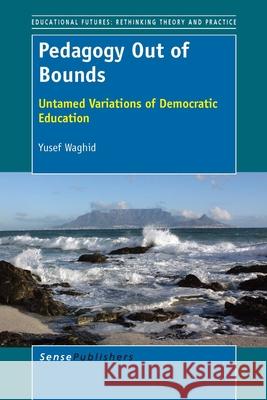Pedagogy Out of Bounds : Untamed Variations of Democratic Education » książka
Pedagogy Out of Bounds : Untamed Variations of Democratic Education
ISBN-13: 9789462096141 / Angielski / Miękka / 2014 / 122 str.
Pedagogy Out of Bounds : Untamed Variations of Democratic Education
ISBN-13: 9789462096141 / Angielski / Miękka / 2014 / 122 str.
(netto: 177,65 VAT: 5%)
Najniższa cena z 30 dni: 180,57
ok. 30 dni roboczych
Dostawa w 2026 r.
Darmowa dostawa!
The focus of this book is on building on current liberal understandings of democratic education as espoused in the ideas of SeylaBenhabib, Eamonnn Callan, Martha Nussbaum, Iris Marion Young and Amy Gutmann, and then examines its implications for pedagogical encounters, more specifically teaching and learning. In other words, pedagogical encounters premised on the idea of iterations (talking back) and reasonable and compassionate action are not enough to engender forms of human engagement that can open up new possibilities and perspectives. Drawing on the works of poststructuralist theorists, in particular the seminal thoughts of Jacques Derrida, Jacques Ranciere, Giorgio Agamben, Jacques Lacan, Stanley Cavell, Maxine Greene, Giles Deleuze and Felix Guattari, and Judith Butler, it is argued that a democratic education in becoming has the potential to rupture pedagogical encounters towards new beginnings on the basis that teachers and students can never know with certainty and completeness. Consequently, it is argued that teaching and learning ought to be associated with pedagogical activities in the making, more specifically a pedagogy out of bounds, in terms of which speech and action would remain positively free, sceptically critical, and responsibly vigilant - a matter of making teaching and learning more authentic so that students and teachers are provoked to see things as they could be otherwise through an enhanced form of ethical and political imagination. It is through pedagogical encounters out of bounds that relations between teachers and students stand a better chance of dealing with the strangeness and mysteries of unexpected, unfamiliar, and improbable action."
The focus of this book is on building on current liberal understandings of democratic education as espoused in the ideas of SeylaBenhabib, Eamonnn Callan, Martha Nussbaum, Iris Marion Young and Amy Gutmann, and then examines its implications for pedagogical encounters, more specifically teaching and learning. In other words, pedagogical encounters premised on the idea of iterations (talking back) and reasonable and compassionate action are not enough to engender forms of human engagement that can open up new possibilities and perspectives. Drawing on the works of poststructuralist theorists, in particular the seminal thoughts of Jacques Derrida, Jacques Ranciere, Giorgio Agamben, Jacques Lacan, Stanley Cavell, Maxine Greene, Giles Deleuze and Felix Guattari, and Judith Butler, it is argued that a democratic education in becoming has the potential to rupture pedagogical encounters towards new beginnings on the basis that teachers and students can never know with certainty and completeness. Consequently, it is argued that teaching and learning ought to be associated with pedagogical activities in the making, more specifically a pedagogy out of bounds, in terms of which speech and action would remain positively free, sceptically critical, and responsibly vigilant - a matter of making teaching and learning more authentic so that students and teachers are provoked to see things as they could be otherwise through an enhanced form of ethical and political imagination. It is through pedagogical encounters out of bounds that relations between teachers and students stand a better chance of dealing with the strangeness and mysteries of unexpected, unfamiliar, and improbable action.











